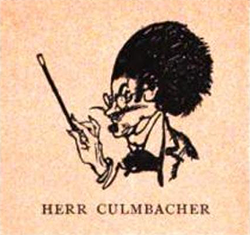The Rocklopedia Fakebandica now has a podcast.
Listen now!
Difference between revisions of "Otto Culmbacher"
| (4 intermediate revisions by the same user not shown) | |||
| Line 1: | Line 1: | ||
| − | Parody of classical conductors in a 1914 short comedy piece called "Those Symphony Concert Programs" by Lawton MacKall. | + | [[Image:Culmbacher_Otto_CenturyMagazine_1914.png|right]]Parody of classical conductors in a 1914 short comedy piece called "Those Symphony Concert Programs" by Lawton MacKall. |
| − | He conducts the generically named ''Metropolitan Symphony Orchestra'' in [[Ptior Kovik-Bordunov]]'s "Gastronomic Symphony," his own "Larghetto," and the | + | He conducts the generically named '''Metropolitan Symphony Orchestra''' in [[Ptior Kovik-Bordunov]]'s "Gastronomic Symphony," his own "Larghetto," and the aria from the opera ''II Campanile'', composed by [[Gondola]], and sung by [[Félice Elefantine]]. |
<blockquote> | <blockquote> | ||
| − | II. Larghetto. This etude is by the | + | II. Larghetto. This etude is by the conductor. (He thought this would be a good place to work it in, the orchestra and audience being powerless to restrain him.) |
| − | |||
| − | to work it in, the orchestra and audience being | ||
| − | powerless to restrain him.) | ||
<br /><br /> | <br /><br /> | ||
| − | Herr Otto Fedor Ivan Culmbacher was | + | Herr Otto Fedor Ivan Culmbacher was born of noble parents in Hofbrau, Silesia. He was discovered and imported to America by the brilliant patronesses of the Metropolitan Symphony Society. |
| − | born of noble parents in Hofbrau, Silesia. He | ||
| − | was discovered and imported to America by | ||
| − | the brilliant patronesses of the Metropolitan | ||
| − | Symphony Society. | ||
<br /><br /> | <br /><br /> | ||
| − | A larghetto is a little largo — one without a | + | A larghetto is a little largo — one without a handel. A composer writes a larghetto when he feels something like writing a largo but isn't, on the whole, quite up to it. |
| − | handel. A composer writes a larghetto when | ||
| − | he feels something like writing a largo but | ||
| − | isn't, on the whole, quite up to it. | ||
</blockquote> | </blockquote> | ||
| Line 26: | Line 16: | ||
*http://books.google.com/books?id=y7iK1r0hxwMC&pg=PA379#v=onepage&q&f=false | *http://books.google.com/books?id=y7iK1r0hxwMC&pg=PA379#v=onepage&q&f=false | ||
| − | See also | + | ==See also== |
| + | *[http://books.google.com/books?id=JWFNAQAAIAAJ&pg=PA473#v=onepage&q&f=false] | ||
| − | [[Category:1914|Culmbacher]] | + | [[Category:1914|Culmbacher, Otto]] |
| + | [[Category:Fictional conductors|Culmbacher, Otto]] | ||
| + | [[Category:Fictional composers|Culmbacher, Otto]] | ||
Latest revision as of 06:41, 30 January 2018
Parody of classical conductors in a 1914 short comedy piece called "Those Symphony Concert Programs" by Lawton MacKall.
He conducts the generically named Metropolitan Symphony Orchestra in Ptior Kovik-Bordunov's "Gastronomic Symphony," his own "Larghetto," and the aria from the opera II Campanile, composed by Gondola, and sung by Félice Elefantine.
II. Larghetto. This etude is by the conductor. (He thought this would be a good place to work it in, the orchestra and audience being powerless to restrain him.)
Herr Otto Fedor Ivan Culmbacher was born of noble parents in Hofbrau, Silesia. He was discovered and imported to America by the brilliant patronesses of the Metropolitan Symphony Society.
A larghetto is a little largo — one without a handel. A composer writes a larghetto when he feels something like writing a largo but isn't, on the whole, quite up to it.
External Links
- http://books.google.com/books?id=htV9udjnvX0C&pg=PA316#v=onepage&q&f=false
- http://archive.org/stream/bizarre00mack#page/190/mode/2up
- http://books.google.com/books?id=y7iK1r0hxwMC&pg=PA379#v=onepage&q&f=false
